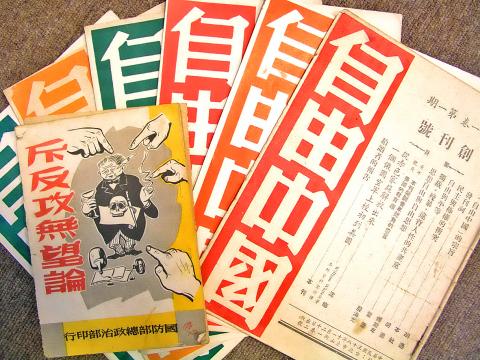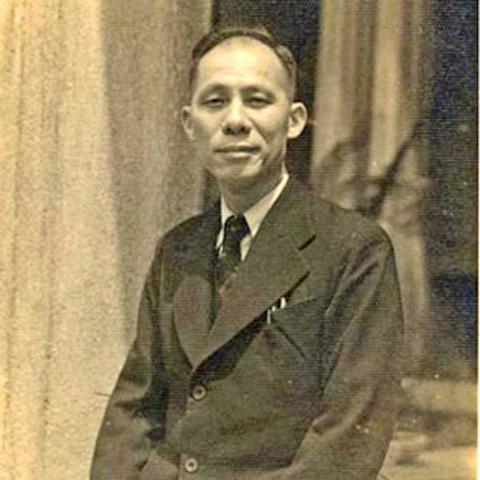Taiwan in Time: Oct. 5 to Oct. 11
In March of 1960, former president Chiang Kai-shek (蔣介石) was nearing the end of his second term, the maximum allowed under the Republic of China (ROC) constitution. In order to allow Chiang to run again, the now defunct National Assembly on March 11 amended the Temporary Provisions Effective During the Period of Communist Rebellion (動員戡亂時期臨時條款) with a provision that froze the term limit.
Back then, there were no public elections and National Assembly members were the only voters. Chiang ran unopposed that year and was subsequently elected to fourth and fifth terms before he died in 1975.

Photo: Chang Jui-chen, Taipei Times
About a month before the term limit was frozen, Free China (自由中國) magazine published on Feb. 1 an article “sincerely advising” Chiang not to run for a third term.
The magazine was founded by a group of intellectuals in 1949 in China as a pro-democracy, anti-communist publication under Chiang’s support. After the organizers retreated to Taiwan with the KMT, the magazine gradually turned from bashing communists to criticizing the lack of democracy and freedom in Martial Law era Taiwan, especially with its call for opposition parties in a time of one-party rule.
Free China’s co-founder and publisher Lei Chen (雷震) was a former high-ranking KMT official. He was expelled from the party in 1954 for running a reader-contributed editorial that criticized political interference in the education system.

Photo courtesy of Academia Historica
On March 1, Lei penned an editorial advising the National Assembly not to amend the constitution, but they did so anyway.
That May, Free China published a commentary stressing the need for a “strong opposition party.” A few weeks later, Lei and other non-KMT reformers — notable for featuring an alliance between mainlanders and ethnic Taiwanese — met to form a new party: the China Democracy Party (中國民主黨).
On Sept. 1, Free China published an article comparing the formation of opposition parties to the Yangtze River flowing east — something that cannot be stopped. That seemed to be the last straw for the KMT, as on Sept. 4, Lei and three others were arrested and charged with sedition — though the government claimed that the arrests weren’t related to opposition activities, instead accusing him of spreading communist propaganda and harboring communists. When a KMT politician spoke out against the verdict, his party membership was suspended for one year.
On Oct. 8, Chiang issued an order that Lei’s sentence should not be less than 10 years, and that no appeal should be allowed. Several hours later, Lei was sentenced to exactly 10 years in prison by a military court. Free China was shut down, and Lei’s collaborators attempted to push forward with the new party to no avail. Taiwan wouldn’t see the successful establishment of an opposition party until the 1980s.
Upon his release in 1970, Lei immediately resumed his previous mission, presenting 10 political and military reforms to the presidential office and Executive Yuan, including renaming the country the Democratic Republic of Chinese Taiwan (中華台灣民主國). He reportedly received no response. He died in 1979.
DOUBLE TEN?
Obviously, this week in history cannot be mentioned without Double Ten National Day, which, like last week’s Teachers’ Day and August’s Father’s Day, is another carryover from when the KMT ruled China and doesn’t actually pertain to Taiwan itself.
On Oct. 10, 1911, Chinese rebels started the Wuchang Uprising, which marked the beginning of the Xinhai Revolution that eventually toppled the Qing Dynasty, ending more than 2,000 years of imperial rule in China.
Even though the Republic of China was officially established on Jan. 1, 1912, later that year, the provisional government designated the anniversary of the uprising as its National Day.
Taiwan celebrated its first Double Ten in 1945 after China, then ruled by the KMT, took over following Japanese surrender. As a result of the KMT losing control of China in 1949, Double Ten became only celebrated as National Day in Taiwan.
Taiwan in Time, a column about Taiwan’s history that is published every Sunday, spotlights important or interesting events around the nation that have anniversaries this week.

It’s a good thing that 2025 is over. Yes, I fully expect we will look back on the year with nostalgia, once we have experienced this year and 2027. Traditionally at New Years much discourse is devoted to discussing what happened the previous year. Let’s have a look at what didn’t happen. Many bad things did not happen. The People’s Republic of China (PRC) did not attack Taiwan. We didn’t have a massive, destructive earthquake or drought. We didn’t have a major human pandemic. No widespread unemployment or other destructive social events. Nothing serious was done about Taiwan’s swelling birth rate catastrophe.

Words of the Year are not just interesting, they are telling. They are language and attitude barometers that measure what a country sees as important. The trending vocabulary around AI last year reveals a stark divergence in what each society notices and responds to the technological shift. For the Anglosphere it’s fatigue. For China it’s ambition. For Taiwan, it’s pragmatic vigilance. In Taiwan’s annual “representative character” vote, “recall” (罷) took the top spot with over 15,000 votes, followed closely by “scam” (詐). While “recall” speaks to the island’s partisan deadlock — a year defined by legislative recall campaigns and a public exhausted

In the 2010s, the Communist Party of China (CCP) began cracking down on Christian churches. Media reports said at the time that various versions of Protestant Christianity were likely the fastest growing religions in the People’s Republic of China (PRC). The crackdown was part of a campaign that in turn was part of a larger movement to bring religion under party control. For the Protestant churches, “the government’s aim has been to force all churches into the state-controlled organization,” according to a 2023 article in Christianity Today. That piece was centered on Wang Yi (王怡), the fiery, charismatic pastor of the

Hsu Pu-liao (許不了) never lived to see the premiere of his most successful film, The Clown and the Swan (小丑與天鵝, 1985). The movie, which starred Hsu, the “Taiwanese Charlie Chaplin,” outgrossed Jackie Chan’s Heart of Dragon (龍的心), earning NT$9.2 million at the local box office. Forty years after its premiere, the film has become the Taiwan Film and Audiovisual Institute’s (TFAI) 100th restoration. “It is the only one of Hsu’s films whose original negative survived,” says director Kevin Chu (朱延平), one of Taiwan’s most commercially successful